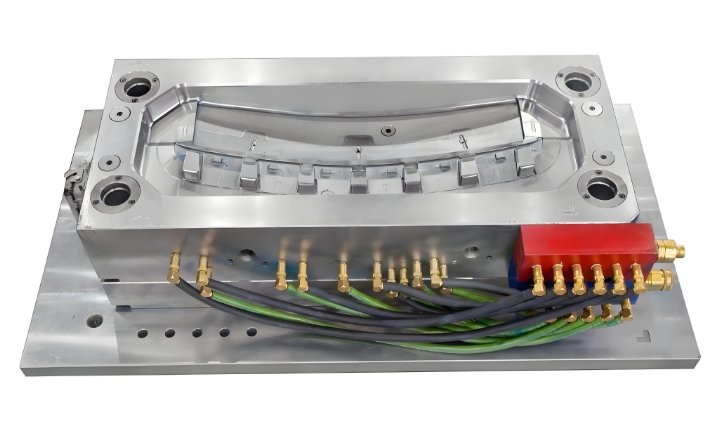
The automotive industry demands high-quality parts. Automotive Injection Molds create strong, precise components. The right materials improve mold performance. Expert Mold Makers select the best materials for durability, speed, and efficiency. New materials enhance production, reduce costs, and improve sustainability.
Why Material Selection Matters
Strength and Durability
Molds face high pressure and heat. Weak materials wear out fast. Strong materials extend mold life.
Precision and Accuracy
Molds must create perfect shapes. Poor material leads to defects. Mold Makers choose materials for accuracy.
Production Speed
Fast cycles reduce costs. Heat-resistant materials cool quickly. This speeds up production.
Sustainability
Eco-friendly materials reduce waste. Many companies prefer recyclable plastics.
Common Materials in Automotive Injection Molds
Steel Alloys
Steel is strong and durable. It resists wear and high pressure.
1. P20 Steel
- Common for plastic molding
- Good strength and polishability
- Moderate cost
2. H13 Steel
- High hardness
- Handles extreme temperatures
- Used for high-production molds
3. S136 Stainless Steel
- High corrosion resistance
- Excellent surface finish
- Ideal for optical and clear parts
Aluminum Alloys
Aluminum is lightweight. It cools faster than steel.
1. 7075 Aluminum
- High strength
- Faster cooling time
- Shorter mold lifespan than steel
2. QC-10 Aluminum
- Great for rapid prototyping
- Used in low-volume production
- High thermal conductivity
Advanced Materials in Automotive Injection Molds
Beryllium Copper
- High thermal conductivity
- Reduces cycle time
- Used for inserts and cooling areas
Nickel Alloys
- High wear resistance
- Corrosion-resistant
- Great for extreme environments
Ceramic Molds
- Ultra-high temperature resistance
- Used for specialized applications
- Costly but highly durable
Titanium Alloys
- Extremely strong
- Corrosion-resistant
- Used in lightweight mold applications
The Role of Mold Makers in Material Selection
Understanding Production Needs
Every part needs a specific material. Mold Makers choose based on function and durability.
Testing for Performance
New materials undergo tests. Strength, heat resistance, and wear get analyzed.
Balancing Cost and Efficiency
High-quality materials improve performance. But costs must remain low. Mold Makers find the best balance.
Innovations in Automotive Injection Molds
1. 3D Printed Molds
- Faster production
- Lower material waste
- Great for prototypes
2. Hybrid Mold Materials
- Combines steel and aluminum
- Improves strength and cooling time
3. Nanocomposite Coatings
- Reduces friction
- Extends mold life
4. Self-Healing Polymers
- Repairs minor scratches
- Enhances mold durability
Applications of Advanced Materials in Automotive Parts
1. Interior Components
- Dashboards and panels need high-precision molds
- Steel molds ensure perfect finishes
2. Exterior Parts
- Bumpers require durable materials
- Nickel alloys prevent surface defects
3. Lighting Systems
- Optical plastics need smooth molds
- Stainless steel ensures clarity
4. Under-the-Hood Components
- Engine parts face extreme heat
- Titanium and nickel alloys perform well
Advantages of Using Advanced Materials
1. Longer Mold Life
- Stronger materials last longer
- Fewer replacements needed
2. Faster Production
- Aluminum and copper alloys cool quickly
- Shorter cycle times mean more output
3. Cost Savings
- Durable molds reduce long-term expenses
- Fewer defects lower waste
4. Better Part Quality
- High-quality molds improve finish
- Precision reduces errors
Challenges in Material Selection
1. High Costs
- Premium materials are expensive
- Companies must justify investments
2. Manufacturing Complexity
- Some materials require special processing
- Skilled Mold Makers are essential
3. Compatibility Issues
- Not all materials work with every plastic
- Testing is necessary
Future Trends in Automotive Injection Molds
1. Smart Molds
- Sensors track temperature and pressure
- Improves mold efficiency
2. AI in Material Selection
- AI predicts best materials for durability
- Reduces testing time
3. Sustainable Materials
- Recycled plastics will gain popularity
- Eco-friendly production will increase
4. Ultra-Lightweight Metals
- Lighter materials improve fuel efficiency
- Stronger alloys will dominate the market
Material choice is critical for Automotive Injection Molds. Strong, heat-resistant, and efficient materials improve mold performance. Skilled Mold Makers select and test the best materials. Advanced materials will shape the future of automotive production.
